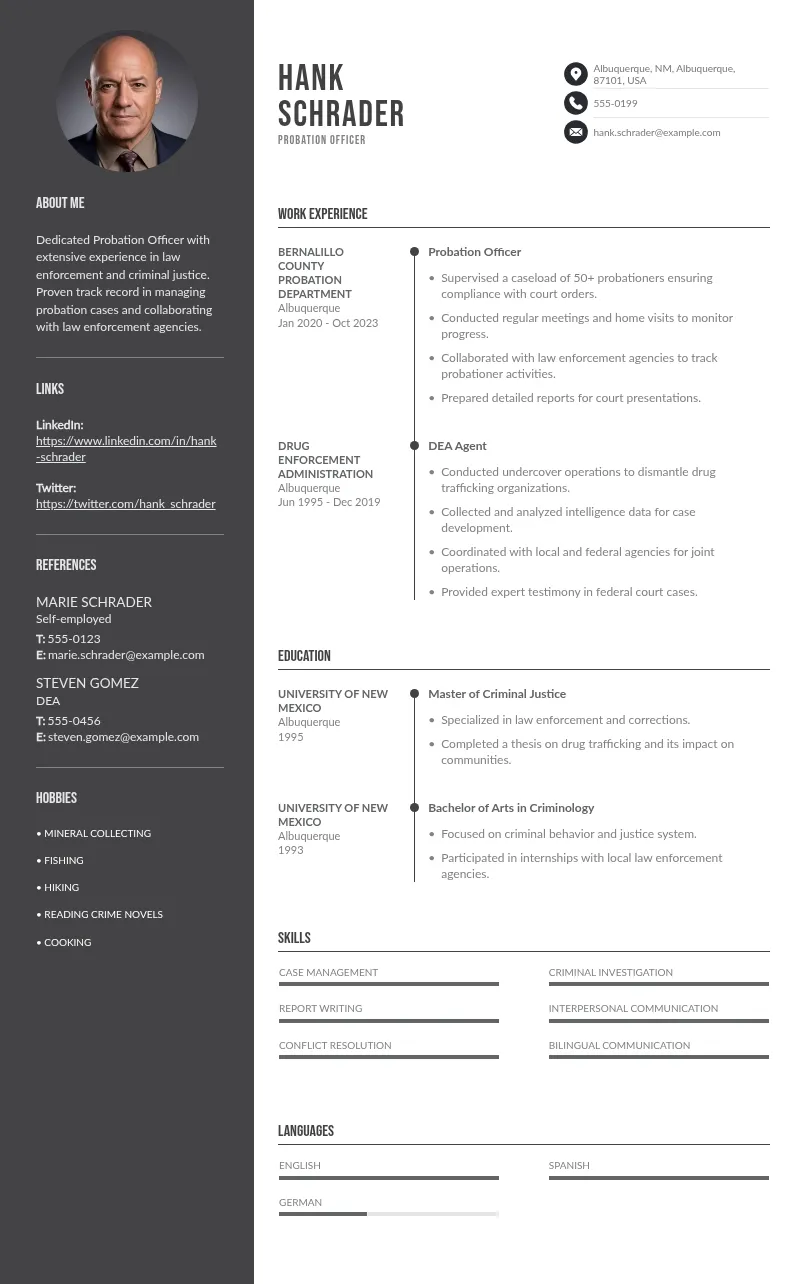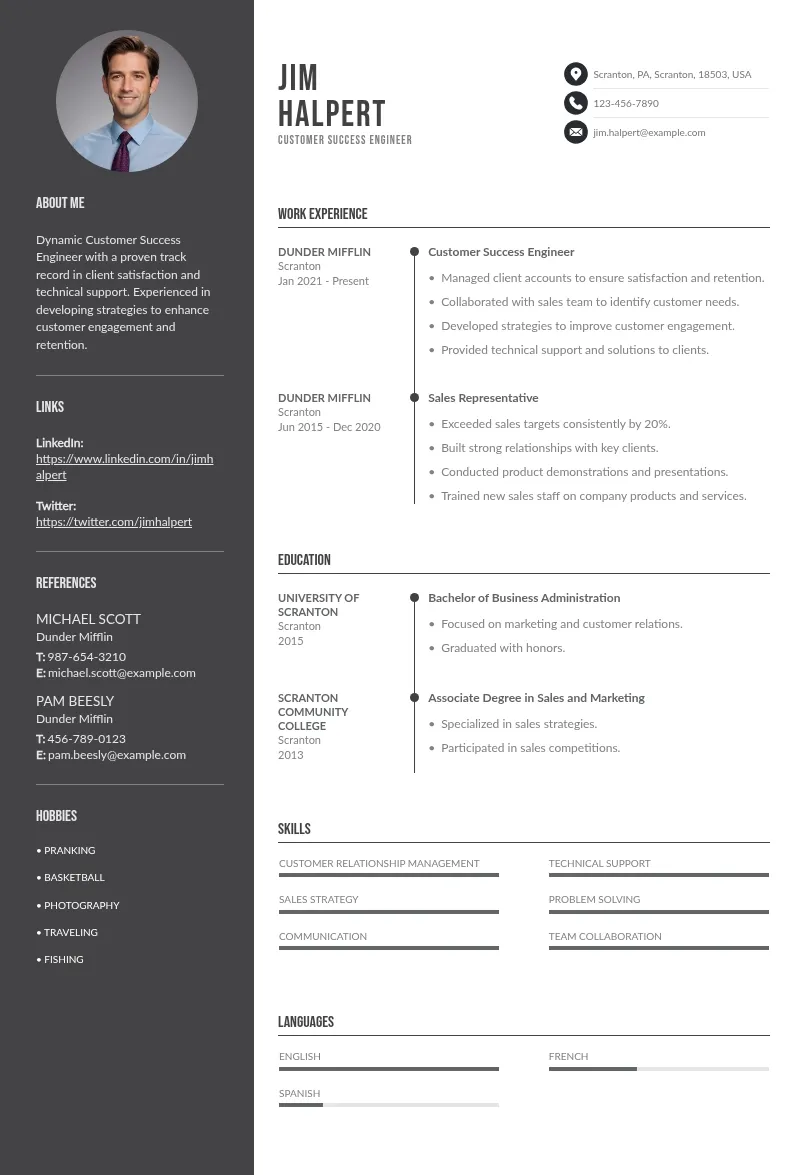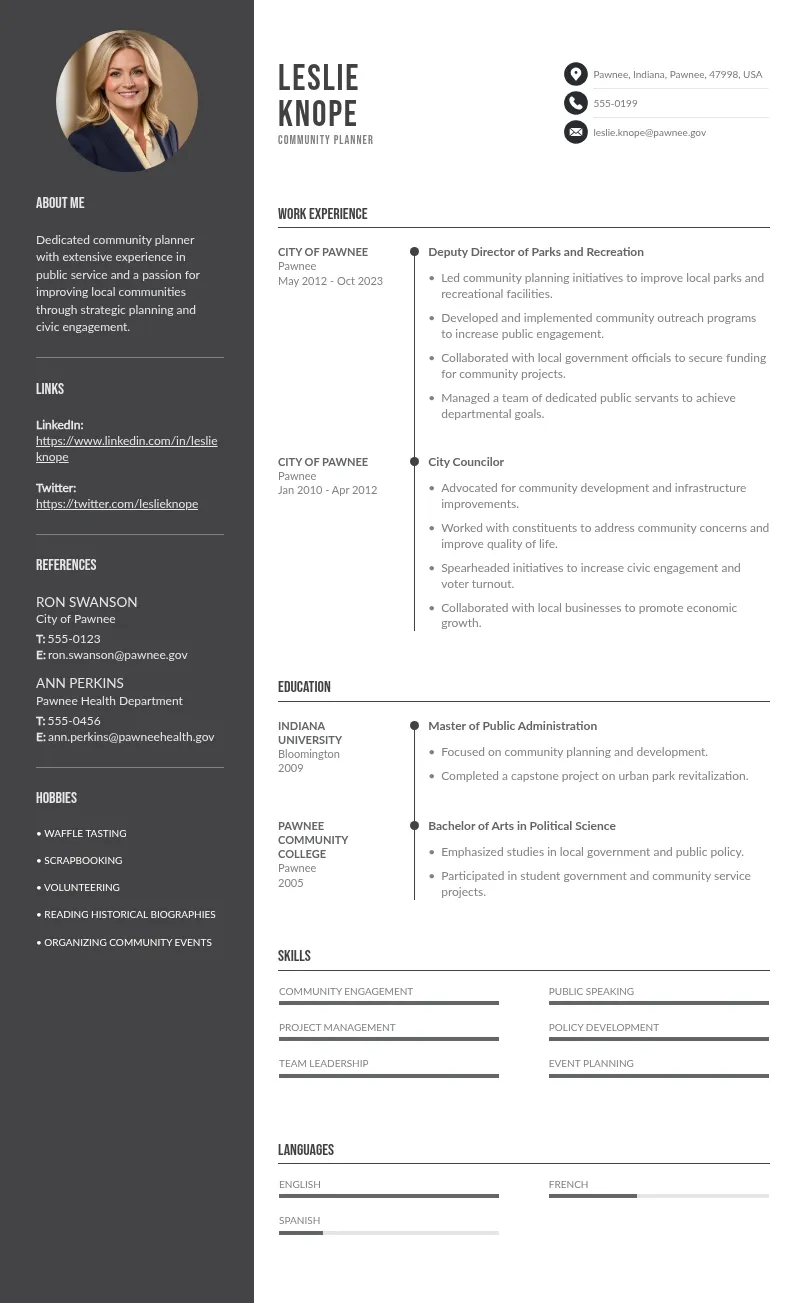Whether you've been in finance for years or you're just stepping up to senior status, crafting a resume that really captures your experience and skills can be a game-changer. It's time to take your achievements, put them in the spotlight, and make sure your resume does more than just tick the boxes—it needs to stand out like a diamond in a sea of spreadsheets.
Here are some key insights you’ll gain from reading this article:
- Example Senior Financial Analyst Resumes
- How to craft a compelling Senior Financial Analyst resume
- Key sections to include and how to optimize them
- The importance of quantifying your achievements
- Highlighting your education and certifications
- The top skills and keywords to make your resume stand out
You might also enjoy these articles:
- Accounting Assistant Resume | Examples, Tips & Templates
- Business Administration Resume Guide with Examples & Template
- Sample Resume for Financial Analyst
- Bookkeeper Resume Examples

Example Senior Financial Analyst Resumes
Let’s dive into some real-world examples to get those creative resume juices flowing. Each example focuses on a different aspect of the Senior Financial Analyst role, helping you see how you can tailor your resume to highlight your unique strengths and experiences.
Example 1: Financial Modeling Focus
Sarah Mitchell
Location: Boston, MA | Phone: (617) 555-0123 | Email: sarah.mitchell@financeguru.com | LinkedIn: linkedin.com/in/sarahmitchellfinance
Profile Summary
I’m a results-driven Senior Financial Analyst with over 8 years of experience in financial modeling, forecasting, and strategic planning. I’ve built financial models that have informed multi-million dollar investment decisions and optimized budgeting processes that reduced operational costs by 15%. My passion lies in translating complex data into actionable insights, helping companies make smarter financial decisions.
Professional Experience
Senior Financial Analyst | GlobalTech Innovations | 2017–Present
- Developed complex financial models for a $100M revenue-generating product line, resulting in a 12% increase in profitability through improved pricing strategies.
- Led the annual budgeting process, delivering a $10M reduction in expenses through in-depth variance analysis and process optimization.
- Collaborated with cross-functional teams to create financial dashboards, providing real-time data to senior management, which improved decision-making speed by 25%.
Financial Analyst | BayState Ventures | 2013–2017
- Created forecasting models that improved accuracy of revenue predictions by 20%, directly influencing strategic business decisions.
- Streamlined financial reporting processes, reducing the time to close month-end reports by 30%.
Education & Certifications
- MBA in Finance | Harvard Business School, 2013
- Certified Financial Analyst (CFA) Level II Candidate
Skills
- Financial Modeling | Data Analysis | Strategic Planning | Budgeting & Forecasting | GAAP & IFRS
Example 2: Leadership & Team Management Focus
Michael Thompson
Location: Chicago, IL | Phone: (312) 555-0456 | Email: michael.thompson@finleadership.com | LinkedIn: linkedin.com/in/michaelthompsonleadership
Profile Summary
With a decade of experience as a Senior Financial Analyst, I’ve honed my leadership skills by managing and mentoring teams of analysts to deliver top-notch financial insights. My expertise lies in driving process improvements and leading financial planning efforts that have consistently exceeded company goals. I thrive in dynamic environments where I can guide teams to achieve operational excellence.
Professional Experience
Senior Financial Analyst | Windy City Capital | 2014–Present
- Managed a team of 5 financial analysts, providing mentorship and professional development that improved team efficiency by 40%.
- Oversaw the financial planning for a $200M division, consistently achieving or exceeding forecasted targets for 4 consecutive years.
- Implemented new financial reporting tools, which reduced reporting errors by 50% and increased data accuracy for executive decision-making.
Financial Analyst | Lakeshore Holdings | 2010–2014
- Led a cross-functional initiative that identified and corrected inefficiencies in financial processes, resulting in a 15% cost reduction.
- Developed training programs for junior analysts, improving overall team performance and readiness for complex financial tasks.
Education & Certifications
- BS in Finance | University of Chicago, 2010
- Certified Public Accountant (CPA)
Skills
- Leadership & Team Management | Process Improvement | Financial Reporting | Risk Management | Cross-Functional Collaboration
Crafting a Winning Profile Summary
This is your chance to grab the reader's attention, set the stage, and give them a snapshot of why you're the Senior Financial Analyst they’ve been searching for. Think of it as your elevator pitch—short, sharp, and packed with punch.

How to Nail Your Profile Summary
Start with the basics: Who are you, and what do you bring to the table? This is where you showcase your qualifications, years of experience, and those key skills that make you stand out in the financial crowd. But don’t just stop there—highlight the unique aspects of your background that are relevant to the role. Are you a wizard with financial modeling in FP&A? Have you managed portfolios that made your company look like investment rockstars? Now’s the time to flaunt it.
Here’s a quick formula to guide you:
- Introduce Yourself: Start with a strong opening line that summarizes your role and experience. "I am a seasoned Senior Financial Analyst with over 8 years of experience in financial planning and analysis, specializing in financial modeling and strategic forecasting."
- Highlight Your Expertise: This is where you shine the spotlight on your financial analysis skills and achievements. "My expertise lies in developing sophisticated financial models that drive business decisions, leading budgeting processes that consistently reduce costs, and mentoring junior analysts to elevate team performance."
- Unique Selling Point: What’s your edge? What do you do better than anyone else? Maybe you’re the go-to person for turning raw data into actionable insights, or perhaps you’ve got a knack for streamlining financial processes. Whatever it is, make it clear. "I’m particularly passionate about simplifying complex financial data into clear, actionable strategies that senior management can execute on."
- Financial Planning & Analysis Pro: "I am a results-oriented Senior Financial Analyst with a decade of experience in financial planning and analysis (FP&A). My track record includes building financial models that have increased profitability by 15% and leading budget processes that have optimized costs across departments. I thrive on turning complex data into strategic insights that drive growth and innovation."
- Portfolio Management Guru: "With 9 years in portfolio management, I have successfully managed multi-million dollar portfolios, consistently delivering above-market returns. My expertise includes risk management, asset allocation, and financial reporting. I am driven by a commitment to maximizing value for stakeholders through data-driven decision-making and strategic planning."
Quick Tips for a Profile Summary
- Keep it Concise: Aim for 3-4 sentences that pack a punch. No fluff, just the good stuff.
- Tailor It: Customize your summary to align with the job description of the role you’re targeting. If they want someone who excels in budgeting, make sure you mention your budgeting prowess.
- Use Metrics: Numbers speak louder than words. Whenever possible, quantify your achievements to showcase your impact.
- Be You: Let your personality shine through. Your Profile Summary should reflect who you are—not just what you’ve done.
Showcasing Professional Experience
This is where you prove that you’re not just all talk but have the results to back it up. It’s not enough to simply list out your job duties; you need to show how you made a real impact. This is where the magic happens, where you turn dry responsibilities into glittering achievements.

Turning Responsibilities into Achievements
You might be thinking, "But I did a lot of things in my last role—how do I make them sound impressive?" The secret is to focus on the outcomes, not just the actions. Instead of saying you "prepared financial reports," tell them you "developed financial reports that identified cost-saving opportunities, resulting in a 10% reduction in expenses."
Here’s the deal: Employers want to see how you’ve moved the needle. Did you drive revenue growth? Cut costs? Improve efficiency? Use metrics and specific examples to quantify your impact. Numbers don’t lie, and they make your resume pop.
Using Metrics to Show Impact
Metrics are your best friend here. They give your achievements weight and make them tangible. Instead of saying you "led a team," you could say you "led a team of 5 analysts, improving reporting accuracy by 20% and reducing month-end close time by 3 days." See the difference? It’s all about showing the value you brought to the table.
Here are a few examples to get you started:
- Budget Management: "Managed the annual budgeting process for a $150M business unit, resulting in a 12% reduction in operational costs and improved forecast accuracy by 15%."
- Financial Analysis & Modeling: "Developed and maintained complex financial models that guided investment decisions, contributing to a 15% increase in portfolio returns over 2 years."
- Reporting: "Created and presented monthly financial dashboards to senior management, leading to a strategic shift that improved quarterly earnings by 8%."
- Budgeting & Forecasting: "Led the budgeting and forecasting process for a $200M division, consistently delivering results within 2% of target projections."
- Risk Management: "Identified and mitigated financial risks through comprehensive risk assessments, reducing potential loss exposure by 20%."
Making the Most of Your Experience
Every role you’ve held is a piece of the puzzle that makes up your professional story. The key is to connect the dots for the reader—show how each experience has built on the last, making you the powerhouse Senior Financial Analyst you are today. Don’t just tell them what you did; show them how you did it better than anyone else.
And remember, it’s not just about the big wins. Even small improvements, when quantified, can demonstrate your value. It’s all about positioning your experience in a way that makes the hiring manager say, "We need someone like that."

Highlighting Education & Certifications
Your education is more than just a box to check off. It’s the foundation of your expertise, so make sure it shines. Include your relevant degrees, but don’t just stop at listing them. Highlight how they’ve equipped you with the skills and knowledge that are directly applicable to the Senior Financial Analyst role.
For instance, if you have an MBA in Finance, don’t just say, "MBA in Finance, [University Name]." Instead, go for something like, "MBA in Finance from [University Name], with a focus on financial modeling and strategic planning, equipping me with the advanced analytical skills needed to drive business decisions." It’s all about connecting the dots between your education and what you bring to the table.
Making the Most of Certifications
Certifications are your secret weapon. They signal to employers that you’re not just keeping up with industry standards—you’re setting them. If you’ve got a CPA, CFA, or any other relevant certification, don’t just list it—spell out why it matters.
Here are some examples that take your education and certifications from basic to brilliant:
Education:
-
MBA in Finance | [University Name]
"Graduated with honors, with a focus on financial modeling, corporate finance, and strategic planning, providing a strong foundation for complex financial analysis and decision-making." -
BS in Accounting | [University Name]
"Specialized in cost accounting and financial reporting, laying the groundwork for a career in detailed financial analysis and budget management."
Certifications:
-
Certified Public Accountant (CPA)
"Demonstrates a deep understanding of financial reporting, tax regulation, and audit standards, ensuring compliance and accuracy in all financial documentation." -
Chartered Financial Analyst (CFA) Level II Candidate
"Advanced proficiency in investment analysis, portfolio management, and ethical standards, preparing me to excel in complex financial environments and strategic decision-making."
Top Skills & Keywords for Senior Financial Analyst Resumes
Your skills are what set you apart from the crowd—they’re the tools you use to drive results and make an impact. Whether it’s your technical expertise or your knack for problem-solving, these are the abilities that hiring managers are looking for, so it’s crucial to spotlight them on your resume.

Hard Skills
These are your technical competencies—the bread and butter of Senior Financial Analysts. Highlight these to show you’ve got the expertise to back up your experience:
- Financial Modeling: Crafting complex models that inform key business decisions.
- Forecasting & Budgeting: Predicting financial trends and managing budgets to align with company goals.
- Variance Analysis: Identifying and explaining variances between expected and actual performance.
- Financial Reporting: Creating accurate and insightful reports for stakeholders.
- Data Analysis & Visualization: Turning raw data into actionable insights with clear visual presentations.
- Cost Accounting: Managing and reducing costs to improve profitability.
- Financial Statement Analysis: Breaking down financial statements to assess company performance.
- Risk Management: Identifying and mitigating financial risks to protect the company.
- Investment Analysis: Evaluating investment opportunities to maximize returns.
- Corporate Finance: Managing company finances to support strategic growth.
- Excel & Spreadsheet Management: Mastering complex spreadsheets to analyze and report data.
- GAAP & IFRS Knowledge: Ensuring compliance with accounting standards.
Soft Skills
These are the interpersonal and cognitive skills that set you apart as a leader and problem-solver:
- Analytical & Problem-Solving Skills: Tackling complex financial problems with innovative solutions.
- Attention to Detail: Ensuring accuracy and precision in every aspect of your work.
- Communication & Interpersonal Skills: Conveying complex financial concepts to non-financial stakeholders.
- Critical Thinking & Decision Making: Making informed decisions based on thorough analysis.
- Adaptability & Flexibility: Thriving in dynamic environments and adjusting to new challenges.
- Time Management & Prioritization: Juggling multiple tasks and deadlines efficiently.
- Leadership & Team Management: Guiding and mentoring teams to achieve their best.
- Collaboration & Cross-Functional Coordination: Working seamlessly with different departments to drive results.
Action Verbs for Senior Financial Analyst Resumes
Power up your resume with strong action verbs that convey impact and initiative. Use these to describe your accomplishments:
- Analyzed
- Forecasted
- Evaluated
- Strategized
- Optimized
- Advised
- Implemented
- Monitored
- Conducted
- Facilitated
- Collaborated
- Communicated
- Synthesized
- Devised
- Allocated
- Audited
- Modeled
- Recommended
Choose your skills and action verbs wisely, and let them do the talking for you—showing you’re not just capable, but exceptional at what you do.

Conclusion
Crafting a standout Senior Financial Analyst resume is all about showcasing the unique blend of skills, experience, and impact that you bring to the table. It’s not just about listing what you’ve done—it’s about telling the story of how you’ve driven results, led teams, and made smarter financial decisions. So, take this opportunity to show potential employers why you’re the analyst they can’t afford to miss out on.
FAQs
To tailor your resume, carefully review the job description and identify key skills, responsibilities, and qualifications the employer is seeking. Highlight your relevant experience and skills that align with these points, using similar language and keywords found in the job posting. This approach shows that you’re a strong match for the role and can help your resume get noticed.
If you lack direct experience, focus on transferable skills and experiences from related roles. Highlight your expertise in financial analysis, reporting, budgeting, or any other relevant areas. Emphasize your willingness to learn, adaptability, and any certifications or education that align with the Senior Financial Analyst role. Tailor your resume to demonstrate how your background has prepared you to step into this position successfully.
Your resume should typically be one to two pages long. Aim to keep it concise while ensuring you include all relevant experience, skills, and accomplishments. For most senior-level positions, a two-page resume is acceptable, but make sure every word adds value and stays focused on your most impactful experiences.
Check out our other articles that you might find interesting:
- Public Accountant Resume | Examples, Templates & Tips
- Senior Accountant Resume| A guide to crafting an impressive resume
- Sample Statistician Resume
- Economist Resume | The Ultimate Guide with Examples and Templates
Create your resume in 15 minutes
Our collection of expertly designed cover letter templates will help you stand out from the crowd and get one step closer to your dream job.


Sample letters to download

































